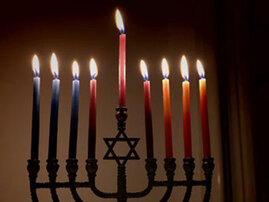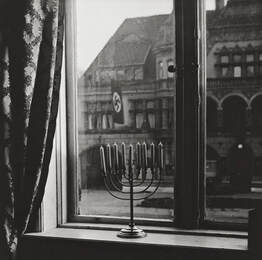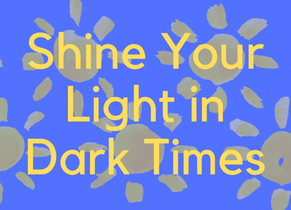| Most every spiritual system has a festival time of year dedicated to shining light in the darkness. As the Northern day reaches its lowest ebb, Jews around the world prepare to celebrate Hanukkah – the Festival of Lights. Hanukkah's nightly ritual of kindling candles has become one of Judaism's most cherished rituals. Especially this year, it's about much more than candles. |
By Rabbi David Evan Markus
Confession: I don't love winter. My November column lamented the dark months, the cold and dank, the expanse of hillside browns and grays. I wasn't born with a Scandinavian's hygge instinct for winter's communal coziness, though I've learned to appreciate its wisdom. Here come sweaters, tea, background music, mood lighting and (I tell myself) extra attention to exercise.
And, here comes Hanukkah, our Festival of Lights.
Confession: I don't love winter. My November column lamented the dark months, the cold and dank, the expanse of hillside browns and grays. I wasn't born with a Scandinavian's hygge instinct for winter's communal coziness, though I've learned to appreciate its wisdom. Here come sweaters, tea, background music, mood lighting and (I tell myself) extra attention to exercise.
And, here comes Hanukkah, our Festival of Lights.

Most spiritual systems feature a festival dedicated to lighting the darkness, most of them timed to the Northern nadir of sunlight. Ancient solstice parties celebrated the "return" of the god of light in Egypt, Persia, Japan and India. During the sun's lowest ebb, ancient Greeks celebrated Haloa, Romans had Saturnalia, and Saxon pagans revered Samhain. In modern times, Hindus honor Diwali, and Christians honor Christmas – all of them festivals of light to transform the darkness.
Hanukkah is Judaism's version of this common human yearning for light amidst darkness.
Historical Hanukkah
In 168 BCE, the army of King Antiochus IV sullied the Temple, persecuted the Jews and forced them to betray their faith. A band of Jewish fighters liberated Judea but found at the Temple too little olive oil to dedicate it anew. The "miracle" of remnant oil lasting eight days (the time needed to make new olive oil for the dedication) would become the basis for Hanukkah and our Festival of Lights. For kickers, Hanukkah literally means "dedication" in Hebrew.
Hanukkah is Judaism's version of this common human yearning for light amidst darkness.
Historical Hanukkah
In 168 BCE, the army of King Antiochus IV sullied the Temple, persecuted the Jews and forced them to betray their faith. A band of Jewish fighters liberated Judea but found at the Temple too little olive oil to dedicate it anew. The "miracle" of remnant oil lasting eight days (the time needed to make new olive oil for the dedication) would become the basis for Hanukkah and our Festival of Lights. For kickers, Hanukkah literally means "dedication" in Hebrew.

Which begs a question: dedication to what?
Simplified only a bit, Hanukkah's historical setting was Jewish resistance to murderous antisemitism and erasure, playing out on a global geopolitical stage – a more pervasive darkness than any turn of the calendar. I think of the Hanukkiyah that Rachel Posner, a rabbi's wife, placed on her windowsill in 1931 Germany. I think of the Hanukkiyah that each Jewish Israeli will light this year amidst events that began on October 7. I think of the Hanukkiyah that each of us will light, connecting us worldwide.
Hanukkah's light is loaded. It's loaded with resistance and resilience, ancestry and modernity, pain and hope. Hanukkah is far more than a seasonal holiday of hygge, home and hearth.
And something more: Hanukkah's origin story has a dark side that has much to teach us.
After their victory, Maccabi forces became zealots for a preservationist and austere Judaism. Even more, the back-to-the-wall experience of near annihilation flipping fast to miraculous liberation unleashed a philosophy of apocalypticism – a belief in messianic end days heralded by a final fight between forces of darkness and forces of light. This belief planted the seeds of the crucifixion of a rebel-rousing rabbi during the Common Era's fourth decade, Rome's destruction of the Second Temple and exile of the Jews in 70 CE (which tradition mourns at Tisha b'Av), and the tragic last stand at Masada.
Dedicating Our Hanukkah Light
Both historically and spiritually, we can draw a direct line from the historical Hanukkah to future spasms of murderous antisemitism, to tragic losses and dazzling victories, to ancestral Jewish pain and the urgency of Israeli self-determination, to Jewish liberation and Jewish zealotry. We ourselves get to choose the lines we draw. We ourselves get to choose what the lights of Hanukkah will mean – especially this year.
Join me in dedicating this year's Hanukkah light to powering us to do right amidst wrong, living proudly and strongly in the integrity of our best selves, standing resiliently against hate in all forms, and uplifting a Judaism forever true to these bright lights. May the lights we kindle stand for the miracles of ancient days, and the miracles possible by our own hands as we reach across chasms in our broken world.
From my heart to yours, I send blessings for a חג אורים שמח / hag urim sameah – a joyous Festival of Lights.
Simplified only a bit, Hanukkah's historical setting was Jewish resistance to murderous antisemitism and erasure, playing out on a global geopolitical stage – a more pervasive darkness than any turn of the calendar. I think of the Hanukkiyah that Rachel Posner, a rabbi's wife, placed on her windowsill in 1931 Germany. I think of the Hanukkiyah that each Jewish Israeli will light this year amidst events that began on October 7. I think of the Hanukkiyah that each of us will light, connecting us worldwide.
Hanukkah's light is loaded. It's loaded with resistance and resilience, ancestry and modernity, pain and hope. Hanukkah is far more than a seasonal holiday of hygge, home and hearth.
And something more: Hanukkah's origin story has a dark side that has much to teach us.
After their victory, Maccabi forces became zealots for a preservationist and austere Judaism. Even more, the back-to-the-wall experience of near annihilation flipping fast to miraculous liberation unleashed a philosophy of apocalypticism – a belief in messianic end days heralded by a final fight between forces of darkness and forces of light. This belief planted the seeds of the crucifixion of a rebel-rousing rabbi during the Common Era's fourth decade, Rome's destruction of the Second Temple and exile of the Jews in 70 CE (which tradition mourns at Tisha b'Av), and the tragic last stand at Masada.
Dedicating Our Hanukkah Light
Both historically and spiritually, we can draw a direct line from the historical Hanukkah to future spasms of murderous antisemitism, to tragic losses and dazzling victories, to ancestral Jewish pain and the urgency of Israeli self-determination, to Jewish liberation and Jewish zealotry. We ourselves get to choose the lines we draw. We ourselves get to choose what the lights of Hanukkah will mean – especially this year.
Join me in dedicating this year's Hanukkah light to powering us to do right amidst wrong, living proudly and strongly in the integrity of our best selves, standing resiliently against hate in all forms, and uplifting a Judaism forever true to these bright lights. May the lights we kindle stand for the miracles of ancient days, and the miracles possible by our own hands as we reach across chasms in our broken world.
From my heart to yours, I send blessings for a חג אורים שמח / hag urim sameah – a joyous Festival of Lights.


 RSS Feed
RSS Feed